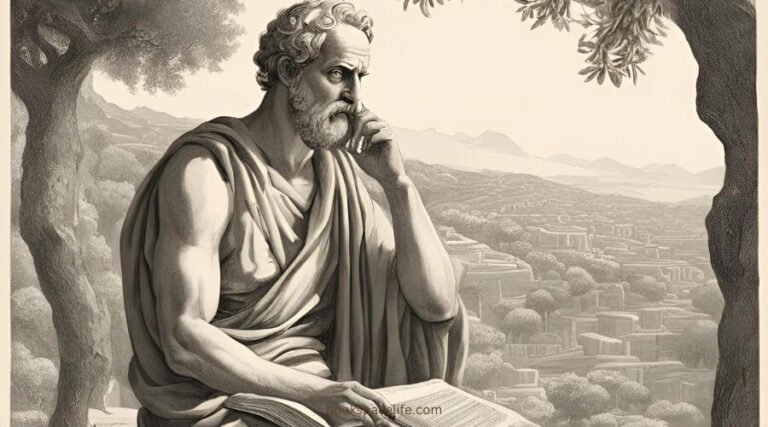Thales of Miletus
Anaxagoras: The Philosopher Who Brought Mind to Matter
Anaxagoras of Clazomenae (500 – 428 BCE) is a pivotal figure in ancient Greek philosophy, renowned for his innovative ideas that combined scientific inquiry with metaphysical speculation.
He is often regarded as one of the first philosophers to introduce the concept of nous, or “mind,” as a fundamental principle in the cosmos.
Anaxagoras’s contributions to philosophy laid the groundwork for future thinkers and helped bridge the gap between the early pre-Socratic philosophers and later developments in science and philosophy.
This blog post will explore Anaxagoras’s life, travels, early education, philosophical contributions, and lasting impact on Western thought.
Quick Read
Table of Contents
(1) Early Life and Education
Anaxagoras was born in Clazomenae, an ancient Ionian city located in modern-day Turkey, around 500 BCE.
Clazomenae was a significant center of trade and culture, providing Anaxagoras with an environment rich in intellectual stimulation.
While little is known about his family background, it is believed that he came from a well-off family that allowed him the opportunity to pursue an education.
The specifics of Anaxagoras’s early education are largely unknown, but it is likely that he was influenced by earlier philosophers such as Thales, Anaximander, and Heraclitus, whose inquiries into the nature of reality and existence set the stage for subsequent philosophical thought.
Anaxagoras’s exposure to these ideas, combined with his inherent curiosity, shaped his philosophical outlook.

(2) Travels and Philosophical Development
In pursuit of knowledge, Anaxagoras traveled to Athens, where he became associated with a vibrant intellectual community that included prominent figures such as Socrates, Pericles, and Euripides.
His time in Athens marked a significant period of philosophical development, allowing him to engage with diverse ideas and broaden his understanding of the cosmos.
Anaxagoras’s life in Athens was marked by his radical ideas, which often clashed with the prevailing beliefs of his time.
He introduced the concept of nous as a cosmic force that brings order to the chaotic world, a notion that distinguished him from his predecessors.
This idea ultimately led to controversy, and Anaxagoras faced accusations of impiety for suggesting that the sun was a fiery rock rather than a divine entity.
(3) Philosophical Contributions
- The Concept of Nous: Central to Anaxagoras’s philosophy is the notion of nous, which he described as an infinite, divine intelligence or mind that orders and governs the universe.
He posited that nous is the cause of all motion and change, bringing harmony and structure to an otherwise chaotic world.
This revolutionary idea of mind as an organizing principle in nature distinguished Anaxagoras from other pre-Socratic thinkers, who often focused on physical elements as the fundamental components of reality.
- Theory of Mixture and Plurality: Anaxagoras proposed that all things are composed of infinitely divisible particles, which he referred to as “seeds” or “homeomeric parts.”
Unlike his predecessors, who posited a singular substance as the basis of reality (such as water for Thales or the apeiron for Anaximander), Anaxagoras argued that the universe contains an infinite variety of elements, each containing a portion of everything.
This view laid the groundwork for later developments in atomism, as it recognized the complexity and multiplicity of matter.
- Cosmic Order and Change: Anaxagoras believed that the world began as a chaotic mixture of elements, and it was the nous that initiated the process of separation and organization.
Through this divine mind, elements were arranged into the ordered cosmos we observe today. His explanation of change as the result of the interaction and separation of these elements was a significant departure from the notion of static existence and highlighted the dynamic nature of reality.
- Astronomy and Natural Philosophy: Anaxagoras made notable contributions to the understanding of celestial phenomena.
He is credited with explaining solar and lunar eclipses, asserting that the moon reflects the light of the sun and that the sun is a fiery mass.
His scientific inquiries into the natural world helped bridge the gap between philosophy and empirical observation, influencing later thinkers who sought to understand the cosmos through rational investigation.
- Ethics and Politics: Although Anaxagoras is primarily known for his metaphysical and scientific ideas, he also engaged with ethical and political questions.
He believed that the pursuit of knowledge and wisdom was essential for living a virtuous life.
His association with prominent political figures in Athens, such as Pericles, reflects his involvement in the political discourse of his time.

(4) Influence and Impact
Anaxagoras’s contributions to philosophy and science had a lasting impact on subsequent thinkers and the development of Western thought:
- Influence on Later Philosophers: Anaxagoras’s ideas significantly influenced philosophers such as Socrates, Plato, and Aristotle.
His concept of nous as a guiding intelligence in the cosmos resonated with Plato’s theory of the Forms, where the ideal realm of Forms provides order to the material world.
Aristotle, too, grappled with the implications of Anaxagorean thought in his exploration of substance and causality.
- Foundation for Scientific Inquiry: Anaxagoras’s emphasis on rational explanations for natural phenomena laid the groundwork for scientific inquiry.
His approach to understanding the cosmos through observation and reason influenced the development of natural philosophy, paving the way for later scientists and philosophers who sought to explain the workings of the universe through empirical investigation.
- Contribution to Atomism: Anaxagoras’s theory of infinitely divisible particles anticipated later developments in atomism, particularly in the works of Democritus and Epicurus.
The idea that all matter consists of small, indivisible components would become a foundational concept in modern physics and chemistry.
- Political Thought and Ethics: Anaxagoras’s involvement in Athenian politics and his emphasis on knowledge as a virtue contributed to the discourse on ethics and governance.
His belief that wisdom is essential for virtuous living influenced later philosophical discussions on the role of knowledge in public life and moral decision-making.
- Cultural Significance: Anaxagoras’s life and work reflect the rich intellectual culture of ancient Greece, characterized by a quest for knowledge and a willingness to challenge established beliefs.
His contributions represent a crucial moment in the transition from mythological explanations of the world to rational, systematic inquiries, setting the stage for the flourishing of philosophy in classical Greece.
- Legacy in Philosophy and Science: Anaxagoras’s legacy endures in the realms of philosophy and science, where his ideas continue to inspire contemporary discussions on the nature of existence, consciousness, and the cosmos.
His integration of mind and matter has implications for modern debates in metaphysics, philosophy of mind, and cognitive science.
(5) Conclusion
Anaxagoras of Clazomenae emerges as a central figure in the history of philosophy, whose innovative ideas about mind, matter, and the nature of reality have left a lasting imprint on Western thought.
His introduction of nous as a guiding principle in the cosmos revolutionized metaphysical inquiry and paved the way for subsequent developments in philosophy and science.
Through his reflections on the nature of existence, Anaxagoras challenged conventional beliefs and encouraged individuals to seek knowledge through rational inquiry and observation.
His legacy endures in philosophical discussions, scientific exploration, and ethical considerations, reminding us of the enduring quest for understanding that characterizes the human experience.
As we contemplate Anaxagoras’s life and teachings, we are invited to consider the interplay between mind and matter, the nature of change, and the complexity of existence.
His work serves as a testament to the power of philosophical inquiry and the importance of engaging critically with our beliefs, inspiring us to explore the mysteries of the universe and our place within it.
(A) 7 Quick Facts on Anaxagoras
- Born in Clazomenae – Anaxagoras was born around 500 BCE in Clazomenae, an ancient Greek city in Ionia (modern day Turkey)
- Moved to Athens – He relocated to Athens, where he became influential in philosophical and scientific discussions.
- Studied under Anaximenes – Anaxagoras was influenced by Anaximenes and other pre-Socratic philosophers in his early education.
- Introduced Nous – He proposed the concept of Nous (Mind or Intellect) as the organizing principle of the cosmos.
- Explained Celestial Phenomena – Anaxagoras provided natural explanations for solar and lunar eclipses, challenging mythological interpretations.
- Brought Philosophy to Athens – He is credited with introducing philosophy and scientific inquiry to Athenian society.
- Imprisoned for Atheism – Anaxagoras was imprisoned for impiety due to his teachings, particularly regarding the sun and celestial bodies.
(B) 10 Quotes attributed to Anaxagoras
- Everything is in everything. Suggesting that all substances contain the elements of everything else.
- Mind (nous) is the cause of all things. Proposing that a divine intellect orders and governs the universe.
- The sun is a fiery mass. Early assertion about the sun’s nature as a physical entity, rather than divine.
- The seeds of all things are in everything. Indicating that everything contains the potential for all things.
- From the infinite, all things come into being. Proposing that the infinite provides the material for all existence.
- The mind is the most divine of all things. Elevating the mind as the highest principle in understanding the cosmos.
- Light is the cause of vision. Acknowledging the role of light in the process of seeing.
- The heavens are not created by the gods, but by nature. Advocating for a naturalistic understanding of the cosmos.
- A mixture is better than a pure substance. Suggesting that combinations of elements create a more complex reality.
- The nature of things is not always apparent. Encouraging inquiry and deeper understanding of the underlying reality.








